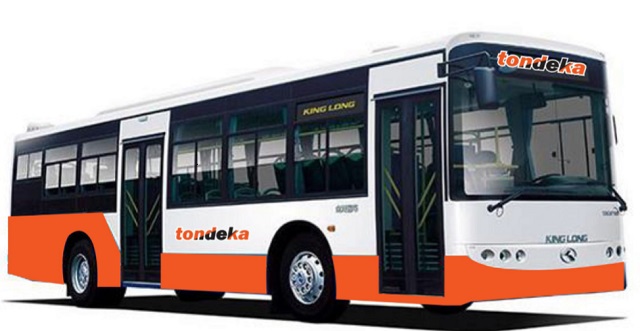
Kampala, Uganda | THE INDEPENDENT | More than 1,000 buses, largely locally-made could be plying the roads between Kampala and neighboring districts later this year, courtesy of a joint venture investment by Kiira Motor Corporation (KMC), Tondeka Metro Company Limited, RentCo Africa Limited (RentCo) and Xiamen Golden Dragon Bus Co. Ltd.
The four have been in discussion for more than a year to get the project going, and this has culminated into the formation of Tondeka Bus Transport Company Limited, a special purpose vehicle. If perfectly implemented, the project will introduce the automated bus fare system in Uganda which the operators say will reduce fraud and the unfair impromptu fare increments by taxis.
According to reports, it is estimated that two million people travel to and from Kampala city on top of the about two million residents that move within the city every day. Of these, 82 percent travel by minibuses, nine percent in private cars and nine percent by boda-boda.
The Tondeka bus will operate two types of buses, one being the Express bus, which will have fewer and permanent stops, and the Regular bus which will stop along the routes as and when demanded. They hope that together with the city authorities, the stages and lanes will have been demarcated by the time the buses are introduced.
Maurice Mukiibi, the Communications and Marketing Manager of Tondeka says they hope the introduction of buses will encourage more people to leave their cars home and travel by bus, hence reducing congestion in Kampala. He says that the buses will charge a single travel fare, with a single trip ticket costing 2,500 Shillings. The daily, weekly and monthly tickets are categorized into two, Standard and Freedom.
The daily Standard ticket will cost 6,000 Shillings while the daily Freedom costs 8,000 Shillings.
The weekly Standard ticket will cost 30,000 Shillings while freedom travellers will pay 40,000 Shillings a week. A standard traveller will end their journey at the designation Tondeka terminal, while the Freedom traveller will board a taxi along the feeder road to their destination. The taxis will be incorporated and paid for by Tondeka.
Tondeka plans to introduce a payment card dubbed the Tondeka Metro Card, which was developed by payments company UnionPay and a technology firm, SCINTL Ltd. The passenger will swipe the bus fare credit card over a machine that will acknowledge payment.
According to the plan, the standard route refers to all main Kampala Metropolitan roads, while Freedom route travellers will have additional taxis to move them from the Tondeka destination to the feeder roads. Through the SPV, the plan is to launch and implement the Mass Transit Bus System for the Greater Kampala Metropolitan Area (GKMA).
The buses will be domestically manufactured by Kiira Motors, the maker of the electric power vehicles, Kiira EV and the Kayoola electric bus according to a highly placed source close to the negotiations. The buses will be built at the Kiira Plant with Golden Dragon leading the provision of technology, while Rentco will finance the 1,030 buses with a cashless ticketing system and lease them to the SPV.
The four have now drawn a roadmap towards the realization of the project, with 350 buses expected to be deployed on the streets of Kampala on or by October 20, this year.
The rest of the 1,030 buses will be deployed in February 2022, according to the action plan of the partners. Gazetting of the bus routes and stages will be completed by July 2, this year. At least 50 of the buses will be electric for the Mass Transit Bus System (MTBS) Project in the Greater Kampala Metropolitan Area.
The project, a direct response to the challenges facing Kampala and other urban authorities is planned to be independent and self-sufficient, securing its own cash for its sustainability. The companies insist that the government shall have no direct liability in the operationalisation of the SPV.
If well and fully implemented, the plan will create 62,000 jobs directly and indirectly including engineers, welders, painters, designers, architects, lawyers, accountants, economists, logistics and supply chain managers, auditors, human resources managers, sales executives, marketers, drivers, stewards and cleaners.
It is also expected to improve passenger boarding and alighting times and reduce overall waiting and travel times to between 30 minutes and one hour on each trip. Currently, the taxi system travel/waiting time is more than 1.3 hours.
*****
URN
 The Independent Uganda: You get the Truth we Pay the Price
The Independent Uganda: You get the Truth we Pay the Price



